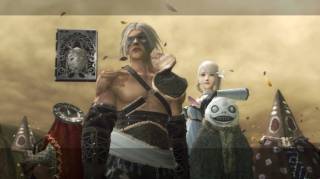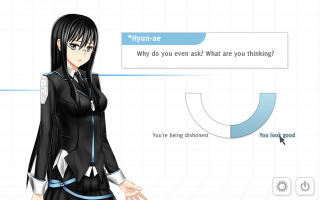Analogue: A Hate Story: A Review I Maybe Shouldn't Have Done
By Pepsiman 3 Comments
I like games that try to make an active appeal to the inner writer in me. Typically, that appeal isn't made through the gameplay, although there are some interesting and hilarious exceptions to that. Rather, as one would typically expect, it tends to happen in the writing, ideally the type that sets up a framework and justification for not only the story I'm exploring, but even the gameplay systems I'm playing around with. It's the reason why I'm probably one of the few people who will actually take a closer look at some games if, say, the right localization team is working on it. Naturally, it usually takes an inherent interest in any game for me to actually go out and play it, but when I find out that such a game has passed through a company like Atlus USA, 8-4, or Nintendo Treehouse, it gives me a sort of reassurance that I'll actually be playing a game whose writing was actually handled by someone who knows their stuff. (Doubly so if the source material itself isn't even all that well-written, which is often the case.) Of course, that's equally true for games that are natively produced in English. I would have still loved Bastion for its gameplay, but knowing that Greg Kasavin was the one greasing the wheels behind the narration was a very appreciated bonus, for instance. A lot of people would probably agree with me on that specific and admittedly increasingly typical example, but it's still a very powerful and legitimizing example of the place good writing can and should have in video games.

In the end, though, most writing in video games have to take an inherent backseat to the gameplay. This is to be expected and is the way it normally should be. I appreciate the part of video games that lets me be proactive in the experience, whether it's linear, nonlinear, or something else entirely. Likewise, though, it means that, a lot of the time, I have to make my interests in seeing good writing a secondary matter. As much as I might like strong writing in video games, very rarely are they able, nor should they be able, to throw gameplay by the wayside and still come out as a positive experience through the sheer power of words alone, a lesson that I was very vividly reminded of while playing the highly contentious Nier. I got some chastising for throwing that game in particular under the bridge like "all the other reviewers" and for not seeing the light that regular "plebian gamers" apparently noticed as plainly as daylight, even if the writing quality itself, which I certainly liked in places, was never the target of criticism in that particular review. I did criticize the fundamental premises of the game itself, but that's not exactly something a localized edition should ever be expected to alter and was therefore a different matter entirely in that review. It was a game that, from what I could tell, tried hedging its bets on its writing and let the rest of its part suffer too greatly as a result. Different strokes for different folks, I suppose, given the game's reception.
It feels a bit strange, then, to put my weight behind Christine Love's latest game, Analogue: A Hate Story, in the form of a review. Much like her previous games, most notably Digital: A Love Story and Don't Take It Personally Babe, It Just Ain't Your Story, the crux of Analogue's experience lies in its narrative, which is told entirely through text. While many people mistake some of her games, particularly Don't Take It Personally, as being visual novels when they, in actuality, share more of a direct lineage with text adventure games, especially the keyboard-input sort that have long since fallen out of vogue, it doesn't change the fact that Love created those games with text first and foremost in mind. There is gameplay, yes, but your main modus operandi for reaching the end of her games is by doing a whole lot of reading. It's good reading, often very good reading as I hope my Analogue review makes at least somewhat clear, but it's more reading than "playing," like one would expect with other video games outside of its genre. It's hard to divine a whole lot to talk about outside of the plot in a regular video game review-style critical piece on a game like that without having it delve into book review-esque territory. I know that's certainly what I experienced while writing the review for Analogue, even if it otherwise took less time overall than most other standard reviews do. I don't even know if it's particularly successful as a review, as I tried going so far out of my way to avoid doing either a video game review or a literary review that the quality of the end result eludes me, even if I liked the change of format.

Knowing that, a lot of other people would probably have understandably simply opted to discuss Analogue within the constraints of a blog, free of the worry of review scores and the like. I probably even just raised a lot of red flags by saying I even attempted to go beyond that sort of coverage for Analogue in opting for a review. After all, even if I have the critical thinking skills necessary to subjectively evaluate it, again, I can't exactly do it on the same sort of playing field I normally would for most any other game. I could have said, "Analogue is a game that takes places on a desolate Korean space freighter hundreds of years in the future, tasked with piecing together the story of how things got so quiet with the assistance of two AIs, *Hyun-ae and *Mute, that are less than amiable towards each other, doing so by reading abandoned logs a plenty, talking to the AIs, and even interacting with the ship's computer interface directly." (At least I finally got that requisite synopsis out of the way.) I could have also discussed the graphics like I usually do and say something like, "The art style works well for what the game is trying to achieve, even if there isn't a whole lot of variety to it." (I do think this.) I could have dissected the sound design and music and said, "Likewise, the aural experience of Analogue is sparse, but ambient."(Also my opinion.) But doing a review that way would have been brazenly missing the point and that's reason enough for a lot of people to take it to the blogging format and discuss it in a more free-form matter. That much I understand.
I still went through with the review, though, because it all goes back to my inherent appreciation for good writing in a video game. The video games I like best are the ones where I can instinctively tell from the get-go what its intent and mission is and executes on all of that well. In Analogue's case, that mission was to take a good, thought-provoking narrative, and walk the player through it word by word. You have to provide some input to make progress in specific places, but it's very tangential. As I wrote in my review, Analogue lives and dies by its text. In doing so, I feel that the game is so respectful (perhaps "indulgent" is a better word) to my personal expectations and beliefs about the power of writing that, in my mind, it was sufficient enough to discuss it in a more concretely critical format. If the game's mission was to get me to take its narrative seriously with just the power of reading, which it certainly did, then I felt it was okay to take it more seriously and break it down through a review of some sort. That's just what I do when I either enjoy or was otherwise sufficiently provoked by a game.
Not that the review itself is all that detail-oriented, or at least not in the ways that I typically write them. There is a score there, which I do feel that the text does enough in justifying both its existence and its value. It's probably less meaningful to a lot of people since the review and my handling of it is so different, but it still has meaning for me. It got me to think about just how much of impact Analogue's story really has made on me and just how well it compares to some of Love's other games. (If you want a brief synopsis I don't even provide in the review, I liked it a lot, but not quite as much as Digital. The score was hardly just the result of that relationship, though, especially considering I've never even reviewed any of Love's other works.) There's also a lot of written dissection conducted over the primary drivers behind Analogue's experience. I wrote that review a lot like I would a more conventional essay or, as some people are probably thinking, the blog I should have probably written instead of this. I feel like the review approach works, though, as it makes me more concretely commit to an opinion on it, much like the game was committed to take its writing seriously and, in turn, getting players to take that quality seriously. It's ultimately a matter of semantics, I suppose, since it's not as though a blog is inherently worth any more or less than a review. But I enjoy the hubris behind it and, admittedly, I have a knack for attracting more attention to myself through my reviews than my blogs, if ones such as this are any indicator. So there's that factor, too, and it's just as true of this blog.
Most of my actual thoughts on the game itself that I feel like conveying are covered in the review itself. I almost got overly personal in breaking down specific character-related issues that I thought I had, but held back on those after some additional contemplation that made me realize I might have been a bit quick to jump to conclusions. Like Digital and Don't Take It Personally, Analogue has a knack for getting you to think about its plot and characters after you've completed it. But this post is still here because the process of that review itself got me to think a lot about how I should be approaching reviews in general and I wanted to share that with this site. For a while now, I've been trying to experiment with how I handle my review formatting since they still, to me at least, feel overly formulaic and writing one on something a lot of people would probably (but disagreeable) argue is a bit of a non-game in some respects went far in outright forcing me to shake things up. Whether I succeeded, I'm not even sure. That review is filled with a whole lot of pretentiousness and writer-ese and is so deliberately ambiguous in places about the specifics of Analogue that I wouldn't be surprised if it's not really considered much of a success. It doesn't really matter either way, though; much like playing Analogue, there's something to be said for just going through the motions, regardless of how you come out in the end. In my case, I actually like how both things turned out, but you can sure both of them will still be on my mind for a while to come. The end has been reached for both the game and that review, but it's not the end.